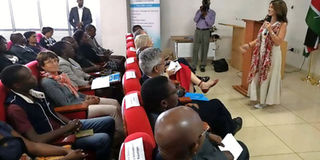Camões’ love affairs and the untold story of Vasco da Gama

Maria Joao Lopo Carvalho, a Portuguese author, makes a presentation at the University of Nairobi. PHOTO | TOM ODHIAMBO
What you need to know:
- One of the world’s greatest poets, and certainly Portugal’s most celebrated, Camões, lived between 1524/1525 and 1580.
- While he also wrote drama, he is immortalised in the Portuguese speaking world and beyond for his lyrical poem, "Os Lusiadas (The Lusiads)".
- This 10-part poem reads like an adventure by the Portuguese into the rest of the world.
Had Vasco da Gama taken the trouble to venture into the inner sanctum of the ruling class in Lisbon and persuaded the King to colonise East Africa, many generations of educated Kenyans would today be familiar with the poetry of Luis Vaz de Camões and would be reciting lines of it in Portuguese.
This would-have-been was recently brought to live by Maria Joao Lopo Carvalho, a Portuguese author, during a discussion of her recent book, Until I Die of Love: The Women Who Camões Loved. Ms Carvalho delved into the life and times of Luis Vaz de Camões at the University of Nairobi, where she attended the launching of a certificate course in Portuguese Language. The course, which will be taught from this month, is in collaboration with the Camões Cultural Institute of Portugal. It was, therefore, a fitting moment to launch a book about.
One of the world’s greatest poets, and certainly Portugal’s most celebrated, Camões lived between 1524/1525 and 1580, and while he also wrote drama, he is immortalised in the Portuguese speaking world and beyond for his lyrical poem, "Os Lusiadas (The Lusiads)". This 10-part poem reads like an adventure by the Portuguese into the rest of the world.
The connection with Kenya in the poem, beyond Camões’ visit to the coastal towns then, is Vasco da Gama’s lamentations at his troubles in Mombasa, followed by the warm invitation from the King of Malindi to be the guests at his palace. There Vasco da Gama is asked to tell the history of Portugal and the conquest of the maritime way to India, achieved finally in the company of a pilot from Malindi.
Ms Carvalho spoke to Saturday Nation about her book, which adds to a long list on this buccaneering but romantic Portuguese hero of the 16th Century.
Her book retells the life of Camões through the voice of seven women, including the poet’s mother. These women’s intimacy with Camões forms the basis of a story that goes back into history to speak of the human spirit of adventure, love, risk, travel, war, pain, joy, not of just one man but of a time, a country, a people and the world.
SN: Tell us about yourself.
LC: I am a woman, a Portuguese author, 56 years old, who has this great dream of writing about other Portuguese authors. Historical fictions could help them to remain unforgettable.
SN: Why write another book on Luis de Camões considering there are several texts on him?
LC: Until I die of Love is a different kind of book. It is not about Camões’ poems, not even about his epic poem. It is only about his adventures and hard life in the 16th century!
SN: Why focus on ‘the women who loved’ Camões considering he loved so many other things?
LP: As an author I feel free to choose one or several points of view in order to follow his life from Lisbon to Mombasa, Malindi and further east to Macau — China. I decided to tell his story through the women he loved. This way I can describe senses, feelings, hurt, and joy of a marvellous and genial human being. There is, of course, the background of the XVI century history, culture, literature geography. We cannot write about him without writing about his world and his time.
SN: What lessons can the world today learn from Camões’ life, especially love life?
LC: The one significant lesson I got from the four years researching and writing is that it is compulsory to read his poems, lyrics and epic.
SN: How do you think Camões’ travels affected his writing?
LC: Totally! He was serving Portugal in Goa as a soldier and a sailor. So, his turbulent life had given him inspiration to write this marvellous master piece about Vasco da Gama’s trip around the world and about the Portuguese history.
SN: What do you think the non-Portuguese speaking world has missed by not reading Camões’ poetry?
LC: People can read whatever they wish. But there are several good translations available of Camoes’ writings in more than 10 languages.
SN: What would feminists say about your book’s presentation of the voices of seven women talking about one man today?
LC: It has nothing to do with feminism, it is just a way of telling the story about his 55 years of life. I chose, as narrators, seve women including his mother, so that, through these voices, the reader would get to know him better as a human being, a poet, a soldier, a lover.
SN: Why did you decide to promote your book in Kenya?
LC: I was in Kenya for two months when I decided to do my own book. This is a similar journey to Camões’, which he made 500 years ago. Just like he had been to Mombasa and Malindi, I, too, visited these towns in November 2015. There is plenty to write about! Kenya has always been a land of adventures.
SN: What would you say is the connection between Camões’ life and Africa?
LC: Another story of love for Portugal.
SN: When is your book being translated into English?
LC: I hope it will be as soon as possible. It is one of my greatest dreams.
Tom Odhiambo teaches literature at the University of Nairobi. [email protected]





